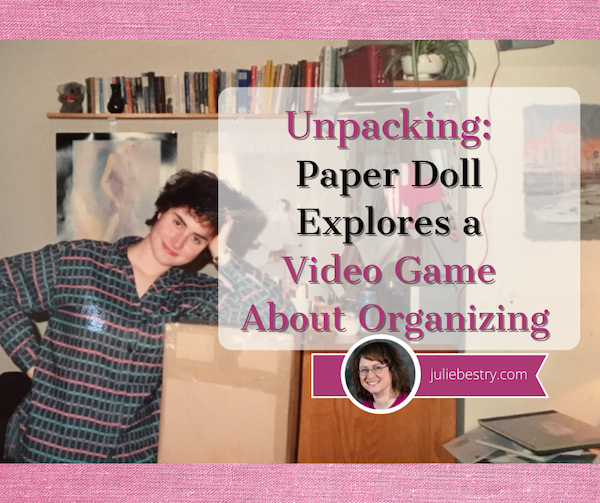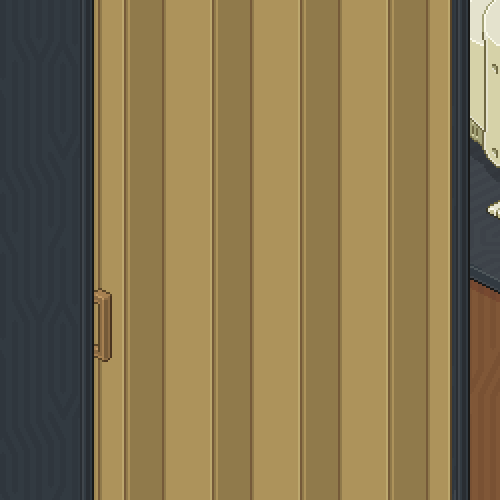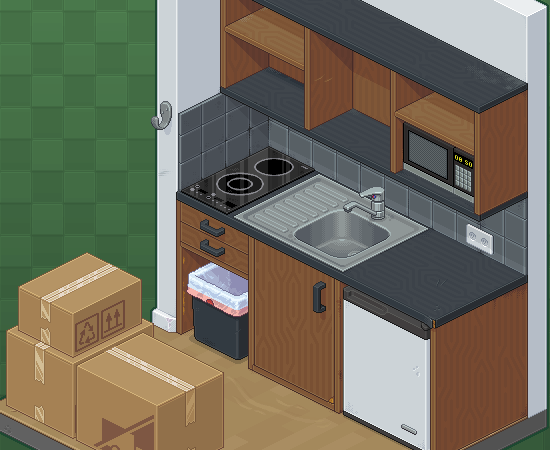Unpacking: Paper Doll Explores a Video Game About Organizing

[Editor’s Note: This is not a typical Paper Doll post, but it is about organizing, so don’t worry that I’ve changed the focus of the blog. Also, if you click on any of the links in the first few paragraphs and get distracted playing classic games in your browser, don’t forget to come back and read the rest of the post!]
UNPACKING

I have limited experience with video games. Which is to say, I played the tennis-like Pong at a friend’s house when it first came out around 1972 and delighted in PacMan (and Ms. Pacman) while waiting for my Pizza Hut meal to be served, during my adolescent years.
And I even plunked myself down to play Super Mario Bros. when I was in graduate school and needed something obsessive and concentration-focusing to take my mind off what the heck I was going to do with my life when graduate school was over.
But game strategy, manual dexterity, competitiveness, and the ability to bonk a cartoon plumber’s head upward onto a brick to make a mushroom appear (if I’m recalling correctly) — none of these have ever been my strong suits.
In the past three decades, my interaction with video games has been limited to helping my clients pare down their video game collections, organize what they keep, and sell or donate the remainder. I haven’t played, or had any desire to play, any games until last week, when Australian game developer Witch Beam released Unpacking. My Google News feed knows me too well, and upon last week’s release, I was inundated with articles and reviews about this intriguing game.
The company describes Unpacking as a “Zen puzzle about unpacking a life.”
The game has eight chapters or levels, each corresponding to a move to a new “home” — a childhood room, a college dorm, one’s own apartment, sharing a space with a significant other, etc. — all for an unnamed, unknown protagonist. It starts in 1997 and continues forward to today. As players, we are never explicitly told the story of this character, but through her possessions, a certain intimate bond is formed.
The game has been described as “part item Tetris, part home decoration.” You select digital cardboard boxes, open them, and through the game, put the items away. There are pre-ordained slots or shelves; the game is designed as a puzzle, and the goal isn’t to throw everything higgledy-piggledy but find the logical home.
To move to the next level, you need to generally put things where a reasonable person might think they should go. That said, as part of the accessibility features of the game, you can apply the “allow items anywhere” option to eliminate the puzzle element. With this choice, you can’t really put an item in the “wrong” place any more than you could in your own home. (Still, please don’t store extra pantry items or clothes in the bathtub; we professional organizers have seen that in the real world, and it’s just not a great option.)
So, just like at your house, you can put things in weird places. And while I haven’t seen a treadmill or Peleton in the game, I’m betting that just like in real life, you can hang your clothes on exercise equipment. As a player, you get to decide where things belong, but you have to obey the laws of physics and geometry. You can’t fit square pegs in round holes or ten pounds of whatever into a five-pound bag.
I find it appealing that there’s no competition and no timers counting down. But there are, apparently, 14,000 different audio sounds to go along with tucking items in nooks and crannies, setting a toothbrush in a water glass, arranging books on shelves and supplies in drawers, and so on. If you lift a T-shirt to a hanger placed on a rod, the shirt hangs; move it lower to a stack of shirts, and it self-folds. (If only actual unpacking, organizing, and indeed, laundry day, were so magical.)

In addition to putting things away (that is, giving them homes), you can change the color signature of the room, add some on-screen stickers to decorate, take photos of a completed room, and add those photos to a scrapbook, complete with a “handwritten” description of your move-in experience.
Here’s a peek at the game’s launch trailer:
Throughout it all, there’s a soundtrack from a BAFTA (British Academy of Film and Television Arts) award-winning composer, Jeff van Dyck. If video game soundtracks are your thing (Yes, I’m looking at you, my friend Chris!), you can listen to Unpacking’s soundtrack on Spotify and purchase it in all the usual music-buying places like Amazon, Apple Music, Bandcamp, etc. (And no, Chris, I’m not listening to this in the car on any road trips.)
Warning: I should also note that, assuming you’re reading in North America, there will be some oddities in the rooms and homes in Unpacking. The refrigerators are not the full-sized ones we have, but those smaller, under-counter ones that are barely bigger than dorm fridges. The bathtubs have the glass half-walls I saw in Europe; I’ve yet to figure out how one manages not to soak the half the bathroom, but at least there’s no need to run any water in the actual game.
I’ve seen reviews calling the game calming and endearing, but also cathartic and moving. (Of which, I have more thoughts, below.) As a professional organizer, of course, I found this tweet hopeful:
Y’all, I already knew @UnpackingALife is a great game, but my daughter is cleaning her room and I was impressed with how much better it looks than normal.
She told me “Unpacking really helped.” Holy crap ? Best game ever!!!! pic.twitter.com/WQNhT3fHd7
— Dr. Ashley Godbold ????? (@ashleygodbold) November 6, 2021
And for those who wonder how much detail is available to organize exactly how and where you want things to be, this tweet gives you a sign:
We definitely didn’t expect this kind of creativity from our replay feature, but we love it so much! ??
Credits: @carellogyhttps://t.co/wZe1SQpICc pic.twitter.com/115WshTfLj
— Unpacking ? Out NOW! (@UnpackingALife) November 7, 2021
Unpacking is available for a variety of platforms, including Windows, Mac, Linux, Nintendo Switch, and Xbox One and runs $19.99.
ACCESSIBILITY
In the real world, unpacking and organizing a new home, whether a dorm room, a studio apartment, or a multi-bedroom family house, can be a massive headache. Imagine how much more difficult is must be for those with physical disabilities or distracting cognitive challenges (ranging from ADHD to traumatic brain injury). This is just one reason why many clients call in NAPO or NASMM professional organizers who specialize in relocations to work some video game-like magic in setting up a new space.

I can’t be the only person who gets flashbacks to Bewitched watching this sped-up kitchen unpacking/organizing scene play out. Seriously, compare it to Samantha Stevens working her tinka-tinka-tink:
There are no in-game professional organizers, but Unpacking‘s developers prides themselves on its accessibility features.
For those needing visual assistance, the user interface buttons can be enlarged, and you can zoom in on the screen; if you’ve made a booboo, the red “invalid” outline (remember what I said about the laws of physics?) can be changed to a different color. And you can disable the animation feature for room-swapping (in case you unpack a box of kitchen items when you’re in the living room) to avoid motion sickness.
In terms of audio assistance, the game lets you operate soundtrack music and sound effect volumes separately, and there are no audio-exclusive cues for game play, so players who can’t hear don’t miss any of the essential game features.
For cognitive accessibility, the game has no penalties; there’s minimal text, and reading skills (in English or otherwise) are not required in order to play. And, as mentioned, you can turn off the puzzle angle to be allowed to put things anywhere.
There are also a variety of mobility-related accessibility features. None of the actions require pressing more than one button at a time, clicking-and-dragging, holding down buttons. Computer versions support playing via a mouse and keyboard, a game pad, or touch (“on supported hardware,” they note) and you can play one-handed with just a mouse. The Nintendo Switch version of the game supports (and I quote, because I have no idea what this means), “gamepad, touch, and gyro in two-handed and one-handed configurations.” Controls are re-mappable when necessary to support a user’s accessibility needs.
While Paper Doll is neither a gamer nor a reviewer, I think it’s important to accent accessibility features in products, and while this does not arise often when I talk about notebooks and storage options, I intend to be more cognizant of such issues in future posts.
UNPACKING THOUGHTS ABOUT UNPACKING
Having missed three decades of video game development, I am, at best, only peripherally aware that not all games are multi-player shoot-em-ups and car-racing (and crashing) extravaganzas. Certainly I knew about The Sims, a series of simulation games where players create virtual people, build them homes (and families) and play with their careers, activities, and moods and desires.
Apparently, this approach is called a sandbox game, an open-ended type of video game where players have a freedom of movement for their creations and there are no pre-set goals. (If only we humans felt that much ease in creating our lives and risking change!) The popular Minecraft, with it’s blocky 3D people and infinitely expanding world of raw materials, tools, and create-able structures is similar.
Unpacking feels like it belongs in a world tangential to these sandbox games; there’s freedom of movement, no timers or competition, and you can’t lose your character’s life by unpacking things in the wrong order or organizing things “wrong.” But like real life, there is a very solid goal for you as the in-world character: unpack in an organized way to live your life.
In Vice‘s Unpacking Is a Lovely Game About the Power of Seemingly Mundane Objects, Moises Taveras has created a great introduction to the game beyond the broad strokes. Through it I learned some spoilers and realized that there was more depth of insight to be had beyond how many frying pans could be fit into a cabinet:
The “challenge,” a term I’ll throw around incredibly loosely, becomes finding where everything fits best. It’s a logic puzzle, so as long as you’ve been in a kitchen, a bedroom or bathroom, you’ll be able to sufficiently reproduce a functional home. … There’s a joy in getting it all right, but the greater one to me was playing a game that, in bits and pieces, understood the relationship we build with the things we collect.
But there’s more. After I learned of Unpacking, I started reading every review I could find, and what’s particularly gripping about the game is how you get to see the protagonist’s life unfold through her possessions (and those with whom she shares her space). It reminded me of Sam Gosling‘s book, Snoop: What Your Stuff Says About You.






Like you, Julie, I’m not a gamer. I have little experience dabbling in the digital game world. However, the “Unpacking” game sounds intriguing on so many levels. Watching the short video was satisfying. I especially liked how the boxes self-folded and magically disappeared. If only! The clicking and moving sounds are also fun. And I will admit that there was a certain sense of satisfaction seeing things get “unpacked” in their new home. I’m sure that’s the organizer in me talking.
But it’s also fascinating that this game is a thing. How hopeful hearing the mom’s response about how her daughter’s playing the game influenced the real-life handling of her room and things. So perhaps this could be an interesting training ground for helping people learn to organize.
Your suggestions are right on. It would be great to introduce a decision-tree component. The choice now is “Where should this thing go?” But wouldn’t it be cool if they got to decide if it even deserved a home? And the paper missing part seems like a big omission too. However, I suspect the younger generation playing the game has much less paper than we see in the 40+ set.
Thanks for the education and entertainment.
I know what you mean! Every time the boxes went *poof* it gave me a sense of accomplishment, and I was only watching, not playing. And I agree; my point about not having a container for donations was that by having to put everything away, it assumed everything SHOULD have a home, and of course, that’s not true with lots of post-move items.
I’m not a gamer either, but my kids are. While I love Tetris, I don’t think I would play this game, and I think of gaming as an escape. The Sims has several games where you are creating your space, and my kids enjoy them. I will have to ask them if they heard of this game.
Sabrina, I imagine it might not be an escape for us, as this is what we do every day; it would be too much of a “busman’s holiday.” But the soothing aspect of it of finding the right space for each item might be comforting for people for whom anxiety is neither a vocation or a daily stressor.
The game just got officially released last Tuesday, but it’s been in development for a few years and has one a lot of awards, so there’s been an ripple of buzz leading up to this release. I’ll be intrigued to hear if your kids know of it.
Holy cow, you really did your research on this one – I’m not a gamer either (never even got into Pacman), but my kids certainly were (son still is) and they really enjoyed Minecraft. Anyway, the only virtual game I play now is Solitaire on my phone, which I think has it’s own special brand of organization that gives me a lot of satisfaction – when I win, anyway! I’m intrigued enough by your post to check out Unpacking and see what I think. And thank you for including the Bewitched clip – I was obsessed with that show as a kid!
Bewitched was the first thing I thought of when I saw the items being unpacked, organized, and put away on their own. Oh my stars, I’m all about the tinka-tinka-tink! And while I don’t play games, I can see that I’d find this very soothing. (After all, there are no “special” requests like someone not wanting the spines of books to be visible, which I’ve heard more than once!)
Wow, what a neat idea for a game (see what I did there?)! I love the idea of educational zen games. Like you, I would enjoy seeing a “time management” version of “Unpacking”.
“Don’t become the curator of the museum of other people’s things.”
What great advice!
LOL, it IS a “neat” idea, Katherine! Thanks for reading!
I, too, am not a gamer – except that I love Tetris. I think this is a fascinating idea for a game but in reading your review, I absolutely agree that there should be a decision tree – walking a person through the questions to consider when holding onto or releasing possessions. Also – we will always have some paper. My 30something son and his wife have a 2 drawer file cabinet. They have learned their lesson well and regularly cull it to replace documents with their current renditions. Paper must be part of what is handled. I’d like to throw my hat in the ring as a person to help develop something like this should the developer decide to update this version of the game. Love this, Julie!
Thanks for weighing in, Diane. Maybe we need to become game developers?!
Oh, what a tempting way to avoid decluttering and organizing in real life! Just as social media is kinda sorta like having friends in real life but not really, this game feels like a great way to “practice” but not make a difference to the clutter in your actual home.
There’s interesting research going on in the hoarding world about virtual reality headsets that can help people become more aware of clutter they’d previously become inured to. I can see the value of that. This game seems more likely to suck someone off into a virtual world and put off tackling their real world clutter.
I’m imaging future editions will allow you to follow different organizing gurus for different results…great marketing idea, but the clutter will remain in real life.
LOL, Lucy, that’s a funny way to look at it, like a replacement for, or procrastination about, the real thing. (Are those violent alien-shooter games helping people who’d otherwise be killing off alien monsters? hmmm.)
I don’t know that people necessarily play video games to avoid the real-world task they’re doing in the game, but I am fascinated by the virtual reality solution for hoarding disorders. Intriguing. But I see this more like Farmville or The Sims or Minecraft. I’m never going to build a neighborhood or plant a field of corn, so playing those games wouldn’t be preventing me from doing so. (But now I want a video game that provides virtual cooking; I hate to cook, but I would enjoy playing a virtual baking game!)
I have to admit, this looks very fun.
I liked the fact that the longer video let’s me faux-play the game without having to buy the game (and, um, a whole gaming console)!